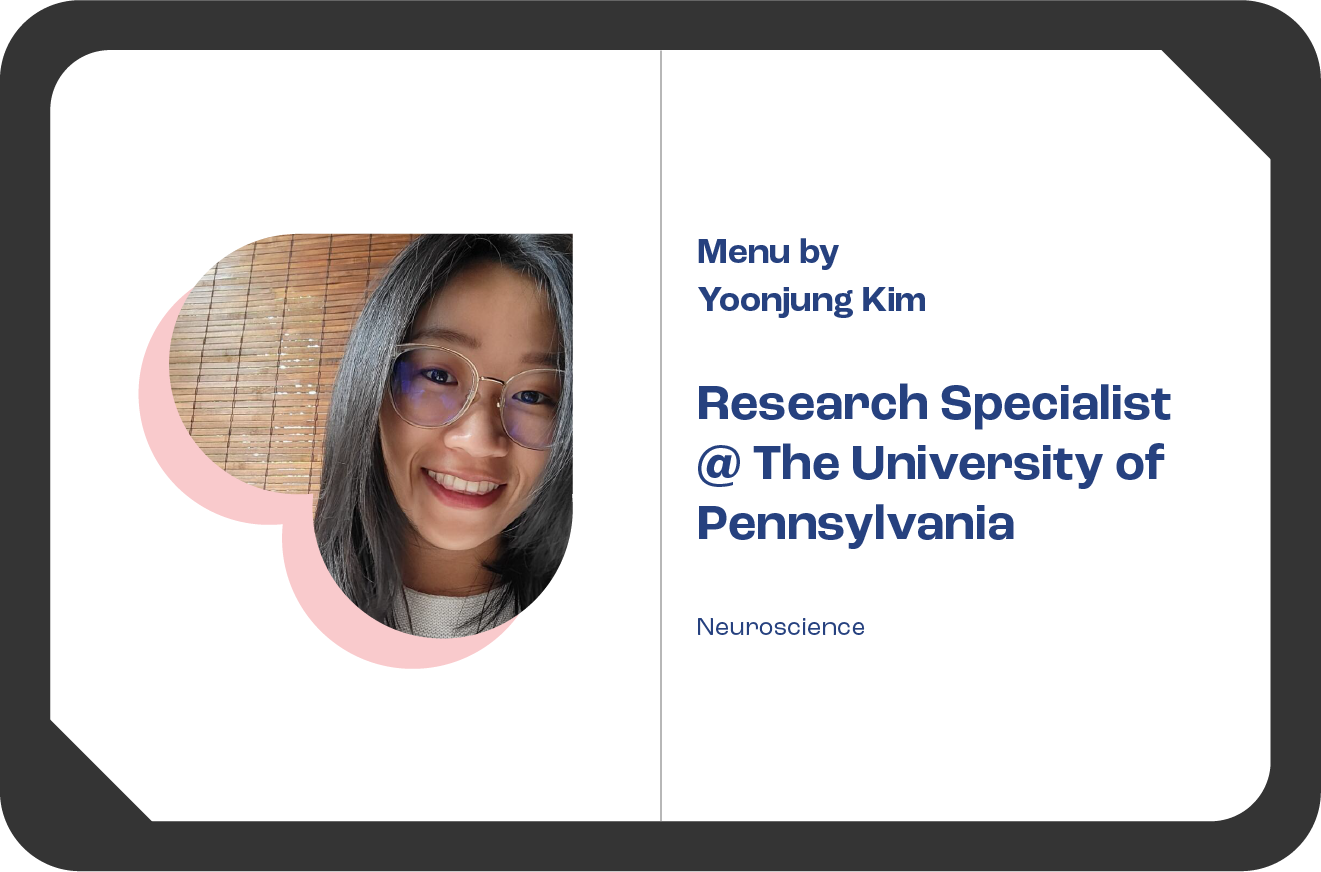
Tasting Room > Healthcare & Life Sciences Table > Yoonjung Kim
Interview conducted in November 2021
Appetizers
Starting with some basics.
Job Title + Years of Experience
Research specialist, 2 years
Areas of Expertise
Neuroscience
Company + Industry
The University of Pennsylvania, Research
Education
Ursinus College, Bachelor's in Biology and Neuroscience
Fun Starters
Getting to know the human side.
Favorite dessert?
Cookies and Cream Ice Cream
Favorite book or movie?
Tangled
Myers-Briggs personality type
ISFJ
What do you like to do for fun?
Hanging out with friends and family
What's one thing you recommend doing in your city, Philadelphia, Pennsylvania?
EAT. There are so many good restaurants in Philly
Main Course
A quick deep dive into the day-to-day job.
Tell us about yourself and your job.
I currently am a lab assistant at the University of Pennsylvania in the department of neurosurgery that researches traumatic brain injury and its effects long-term, like increased risk of developing dementia. As a research tech, I work to help the progression of projects for post-doctoral fellows in the lab.
How did you end up in your field? What do you like about it?
When I learned about how small molecules induce a pathway that is not only imperative in bodily function but also behavior, cognition, and emotion, I gained a whole other level of appreciation for our brains. However, in learning about how brains function, it's also important to learn what can go wrong.
Traumatic brain injury is one of the most common causes of death among young people and has detrimental and life-changing effects for survivors. Knowing that I can contribute to a pool of knowledge that may help develop therapeutic results is what keeps me interested in research.
What does a typical morning look like on the job?
A typical morning at my job starts out with checking emails and reviewing the plans I have for the day. However, mornings can vary depending on what experiments I'm working on. If it's a busy day I'll get started right away on preparing reagents and setting up equipment.
Cool, then what does a typical afternoon look like?
Most of the rest of my day is spent running experiments or analyzing data. Some experiments include injuring neuronal cells or staining cells with antibodies to image under a microscope.
What types of projects and meetings are you involved in?
In my position, much of what I do is based on the projects of post-doctoral fellows and other higher-level researchers. They will have a research question in mind and we will often think together about what experiments we can conduct to answer those questions. Meetings usually involve everyone in the lab giving updates on their progress. People will also share relevant publications to keep everyone up to date on recent neuroscience research.
Who do you collaborate with within meetings and projects?
Collaboration often occurs with other members of the lab. Between bouncing ideas with others and asking for advice on how to proceed, there's a lot of discussion in the lab. I'm also lucky to be working at a large institution with many resources. There are multiple labs at UPenn that are working to answer unknowns regarding traumatic brain injury so there's a lot of collaboration with other labs and hospitals in the Philly area.
Dessert
Now for some juicy insights in the tea room.
What's the most challenging thing about your job?
The most challenging part of my job is troubleshooting along the way while trying to conduct experiments. There is a lot of novel work that goes on in the lab I work in which is exciting but that also means that it's hard to find answers when issues arise. This means I'm often left to figure things out on my own via LOTS of troubleshooting.
What are some characteristics that can help someone succeed in your role?
Be persistent and flexible. Studies and experiments often need to be repeated and they take a lot of work. In the end, you may end up with inconclusive or insignificant results which can be discouraging. So it's important to remind yourself to stay persistent, reassess, and adjust, whether it be your research question or your experimental setup.
Any advice on how to stand out and get hired for those just starting off?
Experience is extremely valuable when applying for these positions after college. I would HIGHLY recommend getting into research as soon as you can in undergrad. I worked in a lab for the majority of my college years and having lab skills under my belt helped me stand out among applicants.
However, if you don't have a lot of experience that's okay! Making it clear that you're eager to learn is very important to interviewers. It's also important to look into the topic of research that the lab you're applying to does (e.g. looking up statistics about TBI-related injuries and the incidence of TBI-associated neurodegeneration). Having a dialogue about the topic you plan to do research on will have a positive impact during the interview.
What's something that surprised you about your job?
How quickly you learn to think critically about the science you read elsewhere.
What do you see your next step being?
I ultimately would like to be a physician and plan on applying to medical school in the next year.
Any last thoughts, advice, or recommendations for someone who wants to do what you do?
Stay curious, questions are what drive research.






